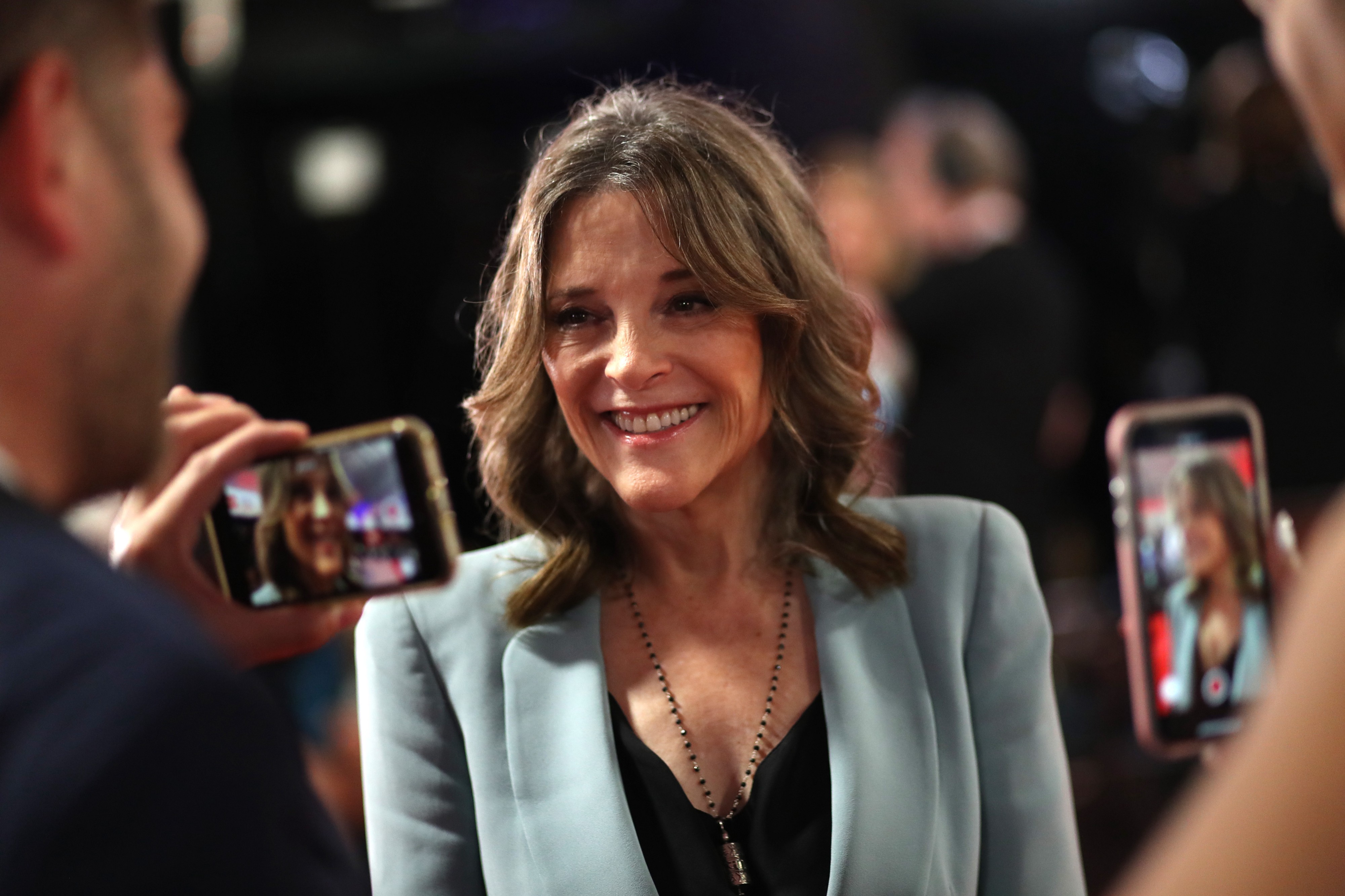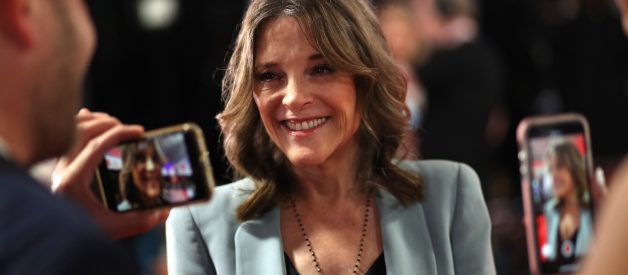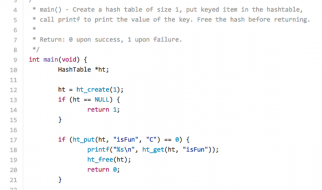It seems nobody has learned from the mistakes of the 2016 election cycle
 Democratic presidential candidate Marianne Williamson speaks to the media in the spin room of the Democratic Presidential Debate at the Fox Theatre. Photo: Justin Sullivan/Getty Images
Democratic presidential candidate Marianne Williamson speaks to the media in the spin room of the Democratic Presidential Debate at the Fox Theatre. Photo: Justin Sullivan/Getty Images
 In 1992, the Los Angeles Times described Marianne Williamson as the ?New Age guru of the hour.? Her spiritual prosthelytizing had propelled her into the heart of Hollywood, to a level of fame that rivaled some of the biggest stars of the era. With her self-help book A Return to Love fresh off the press, Williamson was ?captivating standing-room-only audiences? with her mystical lessons. 27 years later, she?s at it again.
In 1992, the Los Angeles Times described Marianne Williamson as the ?New Age guru of the hour.? Her spiritual prosthelytizing had propelled her into the heart of Hollywood, to a level of fame that rivaled some of the biggest stars of the era. With her self-help book A Return to Love fresh off the press, Williamson was ?captivating standing-room-only audiences? with her mystical lessons. 27 years later, she?s at it again.
During Tuesday?s Democratic presidential debate, Williamson delivered one of the most notable quips of the night: ?If you think any of this wonkiness is going to deal with this dark psychic force of the collectivized hate that this president is bringing up in this country,? she told the audience at Detroit?s historic Fox Theatre, ?then I?m afraid that the Democrats are going to see some very dark days.? The line quickly spread online, leaving in its trail a series of memes. By Wednesday morning, she had been dubbed by CNN ?the newest internet darling,? and was the most Googled candidate in all but one state.
But if you look past the magical thinking, a darker picture emerges. Williamson spreads misinformation and doubt about established science that continues to create confusion and fear. She once called depression a ?spiritual disease? and suggested there was a ?trend of casual antidepressant use.? In June, Williamson reportedly told a group of voters in New Hampshire that vaccine mandates were a ?draconian? and ?Orwellian? injunction, and that the discourse over vaccines was ?no different than the abortion debate.? Williamson also has some strange opinions about the AIDS virus ? she once wrote that it could be cured with forgiveness.
It?s not entirely surprising that a stage like the presidential race would attract someone like Williamson: Running for president has long been a popular publicity strategy for self-help wizards. But it?s shocking to see a candidate like Williamson, with retrograde notions of science and New Agery, still getting traction ? even from prominent opinion makers and journalists. They?re exactly the people who should have learned by now what promoting a political curiosity can mean.
Take Alyssa Milano, for instance. She hasn?t learned anything.
The vocal anti-Trump critic and actor-activist who helped galvanize the #MeToo movement, has made a point to call out the media for normalizing the president?s behavior. ?Instead of [the] news media going ?This is just crazy,? they reported it like it was normal,? Milano said last summer, critiquing news outlets? 2016 campaign coverage. ?We looked at it like ?This is entertaining. This is getting us ratings.??
But for this campaign cycle, it seems there?s a double standard. Milano, apparently, is a Williamson fan.
Ezra Klein, the founder of Vox, also hasn?t learned anything.
Back in 2016, after the first presidential debate between Trump and Hillary Clinton, Klein admonished his fellow journalists for suggesting that Trump ?won? the first half hour of the debate. In a piece published the following morning, Klein noted that, performance aside, Trump ?didn?t know what he was talking about.? As journalists, Klein continued, ?the public isn?t relying on us to tell them what we thought they thought watching the debate. They?re relying on us to tell them what we found when we compared the candidates? answers to reality.?
She was judged on performance, not substance.
But on Tuesday night, in the midst of the Democratic debate, Klein went against his own advice, tweeting: ?Williamson legit outshining most of the candidates on that stage.? And he wasn?t alone. Many others evaluated Williamson along the same criteria. She was judged on performance, not substance.
As for the meme creators who helped to virally propel Williamson?s kooky rule-breaking to a wider and increasingly more receptive audience ? ?Kennedy Cooper,? ?Roy Orbison,? and ?PrincessMononokeynes? ? they haven?t learned anything, either.
?It was ironic at first and then it became post-ironic,? Orbison, a moderator on a community board for Williamson supporters on Discord, told NBC News. PrincessMononokeynes echoed that thought: ?From the beginning, it was a hybrid of irony and post-irony,? they said. ?That said, through the ?woo speak? she actually made some great points. She seemed to me to really understand the psychology of current electoral politics.?
Williamson is a mood. Just like Donald Trump.
It seems Williamson?s overt spirituality is starting to catch on. ?Her philosophy about harnessing love for political purposes, it?s exactly what I was feeling I wanted,? Air Force veteran Mike Spensley told Elle magazine. ?This was the first candidate that I?ve ever spoken to that understands human beings and human psyche,? Dave Navarro, the former Jane?s Addiction guitarist, said. Williamson is a mood. Just like Donald Trump.
Williamson?s supporters ? and perhaps others ? will point to her debate performance on Tuesday as evidence that she understands the problems facing America. And, granted, on Tuesday night, Williamson spoke accurately about at least two serious issues. She made both a compelling argument for devoting billions of dollars to reparations, and accurately described the deeper issues of inequality surrounding the clean water crisis in Flint, Michigan. ?We have communities, particularly communities of color and disadvantaged communities all over this country who are suffering from environmental injustice? this is part of the dark underbelly of American society; the racism, the bigotry,? she said.
That?s true! But so what? Back in 2015, as Trump marauded his way through the Republican primaries, he too occasionally said things that felt equally accurate ? even to those who hated him. He criticized America?s endless wars, its desire for political dynasties, its insane campaign financing methods, and his own party?s willingness to suggest further cuts to Medicare and Social Security. Yet in office, Trump has constantly threatened war, pushed the boundaries of acceptable political fundraising, and implemented a massive tax cut that has mostly benefited the wealthiest Americans.
Williamson, like Trump, can recognize problems ? she understands people are depressed or ill. But like Trump, she?s hardly demonstrated that she knows how to fix them.
Williamson is an interesting person to watch, and says funny things. But that?s it. The reality is that, amidst a large field of candidates, she is one of the least qualified to be president. We should have learned to ignore her.


